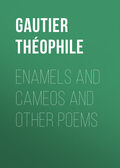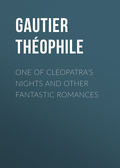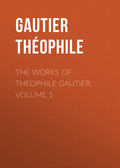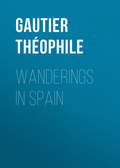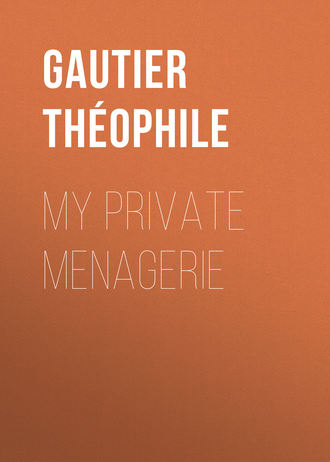
Gautier Théophile
My Private Menagerie
Her companion now is a magnificent angora cat, whose gray and silver fur recalls Chinese spotted porcelain. He is called Zizi, alias “Too Handsome to Work.” The handsome fellow lives in a sort of contemplative kief, like a theriaki under the influence of the drug, and makes one think of “The Ecstasies of Mr. Hochenez.” Zizi is passionately fond of music, and, not satisfied with listening to it, he indulges in it himself. Sometimes, in the dead of night, when everybody is asleep, a strange, fantastic melody, which the Kreislers and the musicians of the future might well envy, breaks in upon the silence. It is Zizi walking upon the key-board of the piano which has been left open, and who is at once astonished and delighted at hearing the keys sing under his tread.
It would be unjust not to link with this branch Cleopatra, Eponine’s daughter, whose shy disposition keeps her from mingling in society. She is of a tawny black, like Mummia, Atta-Croll’s hairy companion, and her two green eyes look like huge aqua-marines. She generally stands on three legs, her fourth lifted up like a classical lion that has lost its marble ball.
These be the chronicles of the Black Dynasty. Enjolras, Gavroche, and Eponine recall to me the creations of a beloved master; only, when I re-read “Les Misérables,” the chief characters in the novel seem to me to be taken by black cats, a fact that in no wise diminishes the interest I take in it.
IV
THIS SIDE FOR DOGS
I have often been charged with not being fond of dogs; a charge which does not at first sight appear to be very serious, but which I nevertheless desire to clear myself of, for it implies a certain amount of dislike. People who prefer cats are thought by many to be cruel, sensuous, and treacherous, while dog-lovers are credited with being frank, loyal, and open-hearted, – in a word, possessed of all the qualities attributed to the canine race. I in no wise deny the merits of Médor, Turk, Miraut, and other engaging animals, and I am prepared to acknowledge the truth of the axiom formulated by Charlet, – “The best thing about man is his dog.” I have been the owner of several, and I still own some. Should any of those who seek to discredit me come to my house, they would be met by a Havana lap-dog barking shrilly and furiously at them, and by a greyhound that very likely would bite their legs for them. But my affection for dogs has an understratum of fear. These excellent creatures, so good, so faithful, so devoted, so loving, may go mad at any moment, and then they become more dangerous than a lance-head snake, an asp, a rattlesnake or a cobra capella. This reacts on my love for dogs. Then dogs strike me as a bit uncanny; they have such a searching, intense glance; they sit down in front of you with so questioning a look that it is fairly embarrassing. Goethe disliked that glance of theirs that seems to attempt to incorporate man’s soul within itself, and he drove away dogs, saying, “You shall not swallow my monad, much as you may try.”
The Pharamond of my canine dynasty was called Luther. He was a big white spaniel, with liver spots, and handsome brown ears. He was a setter, had lost his owner, and after looking for him a long time in vain, had taken to living in my father’s house at Passy. Not having partridges to go after, he had taken to rat-hunting, and was as clever at it as a Scotch terrier. At that time I was living in that blind alley of the Doyenné, now destroyed, where Gérard de Nerval, Arsène Houssaye and Camille Rogier were the heads of a little picturesque and artistic Bohemia, the eccentric mode of life in which has been so well told by others that it is unnecessary to relate it over again. There we were, right in the centre of the Carrousel, as independent and solitary as on a desert island in Oceanica, under the shadow of the Louvre, among the blocks of stone and the nettles, close to an old ruinous church, with fallen-in roof which looked most romantic in the moonlight. Luther, with whom I was on a most friendly footing, seeing that I had finally abandoned the paternal nest, made a point of coming to see me every morning. He started from Passy, no matter what the weather was, came down the Quai de Billy, the Cours-la-Reine, and reached my place at about eight o’clock, just as I was waking. He used to scratch at the door, which was opened for him, and he dashed joyously at me with yelps of joy, put his paws on my knees, received with a modest and unassuming air the caresses his noble conduct merited, took a look round the room, and started back to Passy. On arriving there, he went to my mother, wagged his tail, barked a little, and said as plainly as if he had spoken: “I have seen young master; don’t worry; he is all right.” Having thus reported to the proper person the result of his self-imposed mission, he would drink up half a bowlful of water, eat his food, lie down on the carpet by my mother’s chair, – for he entertained peculiar affection for her, – and sleep for an hour or two after his long run. Now, how do people who maintain that animals do not think and are incapable of putting two and two together explain this morning visit, which kept up family relations and brought to the home-nest news of the fledgeling that had so recently left it?
Poor Luther’s end was very sad. He became taciturn, morose, and one fine morning bolted from the house, feeling the rabies on him and resolved not to bite his masters; so he fled, and we have every reason to believe that he was killed as a mad dog, for we never saw him again.
After a pretty long interregnum a new dog was brought into the house. It was called Zamore, and was a sort of spaniel, of very mixed breed, small in size, with a black coat, save the tan spots over his eyes and the tan hair on his stomach. On the whole he was insignificant physically, and ugly rather than handsome; but morally, he was a remarkable dog. He absolutely despised women, would not obey them, never would follow them, and never once did my mother or my sisters manage to win from him the least sign of friendship or deference. He would accept their attentions and the tit-bits they gave him with a superior air, but never did he express any gratitude for them. Never would he yelp, never would he rap the floor with his tail, never bestow on them a single one of those caresses dogs are so fond of lavishing. He remained impassible in a sphinx-like pose, like a serious man who will not take part in the conversation of frivolous persons. The master he had elected was my father, in whom he acknowledged the authority of the head of the house, and whom he considered a mature and serious man. But his affection for him was austere and stoical, and was not shown by gambadoes, larks, and lickings. Only, he always kept his eyes upon him, followed his every motion and kept close to heel, never allowing himself the smallest escapade or the least nod to any passing comrades. My dear and lamented father was a great fisherman before the Lord, and he caught more barbels than Nimrod ever slew antelopes. It certainly could not be said of his fishing-rod that it was a pole and string with a worm at one end and a fool at the other, for he was a very clever man, and none the less he daily filled his basket with fish. Zamore used to accompany him on his trips, and during the long night-watches entailed by ground-line fishing for the big fellows, he would stand on the very edge of the water, apparently trying to fathom its dark depths and to follow the movements of the prey. Although he often pricked up his ears at the faint and distant sounds that, at night, are heard in the deepest silence, he never barked, having understood that to be mute is a quality indispensable in a fisherman’s dog. In vain did Phœbe’s alabaster brow show above the horizon reflected in the sombre mirror of the river; Zamore would not bay at the moon, although such prolonged ululation gives infinite delight to creatures of his species. Only when the bell on the set-line tinkled did he look at his master and allow himself one short bark, knowing that the prey was caught; and he appeared to take the greatest interest in the manœuvres involved in the landing of a three or four pound barbel.
No one would have suspected that under his calm, abstracted, philosophical look, this dog, so serious that he was almost melancholy, and despised all frivolity, nursed an overmastering, strange, never to be suspected passion, absolutely contrary to his apparent moral and physical character.
“You do not mean,” I hear my reader exclaim, “that the good Zamore had hidden vices? – that he was a thief?” No. “A libertine?” No. “That he loved brandied cherries?” No. “That he bit people?” Never. Zamore was crazy about dancing. He was an artist devoted to the choregraphic art.
He became conscious of his vocation in the following manner. One day there appeared on the square at Passy a gray moke, with sores on its back, and drooping ears, one of those wretched mountebanks’ asses that Decamps and Fouquet used to paint so well. The two baskets balanced on either side of his raw and prominent backbone contained a troupe of trained dogs, dressed as marquesses, troubadours, Turks, Alpine shepherdesses, or Queens of Golconda, according to their sex. The impresario put down the dogs, cracked his whip, and suddenly every one of the actors forsook the horizontal for the perpendicular position, and transformed itself into a biped. The drum and fife started up and the ballet commenced.
Zamore, who was gravely idling around, stopped smitten with wonder at the sight. The dogs, dressed in showy colours, braided with imitation gold lace on every seam, a plumed hat or a turban on their heads, and moving in cadence to a witching rhythm, with a distant resemblance to human beings, appeared to him to be supernatural creatures. The skilfully linked steps, the slides, the pirouettes delighted but did not discourage him. Like Correggio at the sight of Raphael’s painting, he exclaimed in his canine speech, Anch’ io son pittore! and when the company filed past him, he also, filled with a noble spirit of emulation, rose up, somewhat uncertainly, upon his hind legs and attempted to join them, to the great delight of the onlookers.
The manager did not see it in that light, and let fly a smart cut of his whip at Zamore, who was driven from the circle, just as a spectator would be ejected from the theatre did he, during the performance, take on himself to ascend to the stage and to take part in the ballet.
This public humiliation did not check Zamore’s vocation. He returned home with drooping tail and thoughtful mien, and during the whole of the remainder of that day was more reserved, more taciturn, and more morose than ever. But in the dead of night my sisters were awakened by slight sounds, the cause of which they could not conjecture, which proceeded from an uninhabited room next theirs, where Zamore was usually put to bed on an old arm-chair. It sounded like a rhythmic tread, made more sonorous by the silence of night. They at first supposed that the mice were romping round, but the sound of steps and leaps on the flooring was too loud for that. The bravest of my sisters rose, partly opened the door, and by the light of a moonbeam streaming in through a pane, she beheld Zamore on his hind legs, pawing the air with his fore paws, and busy studying the dancing steps he had admired in the street that morning. The gentleman was practising!
Nor did this prove, as might be supposed, a passing fancy, a momentary attraction; Zamore persisted in his choregraphic aspirations and turned out a fine dancer. Every time he heard the fife and drum he would run out on the square, slip between the spectators’ legs and watch, with the closest attention, the trained dogs performing their exercises. Mindful, however, of the whip-cut, he no longer attempted to take part in the dancing; he took note of the poses, the steps, and the attitudes, and then, at night, in the silence of his room, he would work away at them, remaining the while, during the day, as austere in his bearing as ever. Ere long he was not satisfied with copying; he took to composing, to inventing, and I am bound to say few dogs surpassed him in the elevated style. I often used to watch him through the half-open door; he practised with such enthusiasm that every night he would drain dry the bowl of water placed in one corner of the room.
When he had become quite sure of himself and the equal of the most accomplished of four-footed dancers, he felt he could no longer hide his light under a bushel and that he must reveal the mystery of his accomplishments. The court-yard of the house was closed, on one side, by an iron fence with spaces sufficiently wide to allow moderately stout dogs to enter in easily. So one fine morning some fifteen or twenty dog friends of his, connoisseurs no doubt, to whom Zamore had sent letters of invitation to his début in the choregraphic art, met around a square of smooth ground nicely levelled off, which the artist had previously swept with his tail, and the performance began. The dogs appeared to be delighted and manifested their enthusiasm by ouahs! ouahs! closely resembling the bravi of dilettanti at the Opera. With the sole exception of an old and pretty muddy poodle, very wretched looking, and a critic, no doubt, who barked out something about forgetting sound tradition, all the spectators proclaimed Zamore the Vestris of dogs and the god of dancing. Our artist had performed a minuet, a jig, and a deux temps waltz. A large number of two-footed spectators had joined the four-footed ones, and Zamore enjoyed the honour of being applauded by human hands.



